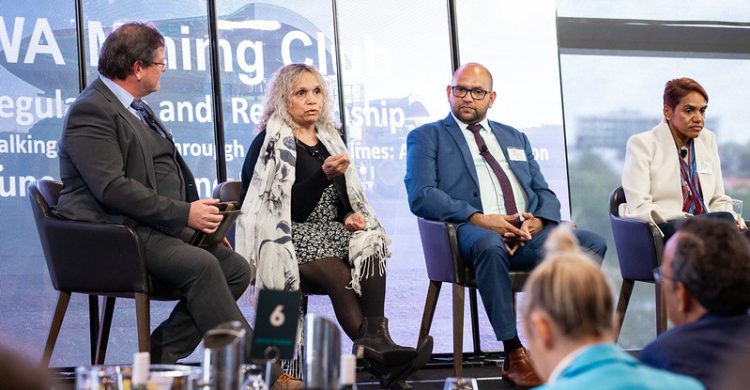
The Western Australian Mining Club’s luncheon facilitated a thought-provoking panel discussion. The focal point of the discourse revolved around the upcoming transition of regulations under the Aboriginal Heritage Act 1972 to the Aboriginal Cultural Heritage Act 2021. Esteemed panelists, Tania Champion, Kyra Galante, and Brenden Taylor, along with moderator Marshall McKenna, engaged in a discussion about the implications of these changes for the mining industry in Western Australia.
Western Australia is full of rich history and abundant natural resources. The vast land is home to some of the oldest sites of continual human habitation, demonstrating the deep connection between the Indigenous peoples and the land they have inhabited for thousands of years. At the same time, WA boasts a significant diversity and volume of mineral wealth, attracting miners and explorers from around the globe.
The imminent changes in regulation present an opportunity for reflection and improvement. The panelists recognised the need for the industry to prioritises relationships with Traditional Custodians over mere compliance with regulations. By forging strong alliances based on respect and mutual understanding, the mining industry can effectively contribute to the preservation and celebration of Aboriginal cultural heritage.
Tania Champion, has over 20 years’ experience in Mining and Exploration. She is a Geological Tenement Administrator/Consultant/Officer with experience managing tenements in Western Australia and Queensland. As an influential figure in the mining industry and an advocate for Indigenous engagement, Tania emphasised the importance of recognising the stories of the land and acknowledging the wisdom of Elders past, present, and emerging. She called for a paradigm shift, where the industry moves away from a transactional mindset and towards one that fosters genuine partnerships with Traditional Custodians. By listening to their perspectives, valuing their knowledge, and including them in decision-making processes, miners and explorers can tap into a wealth of cultural and environmental insights that will pave the way for sustainable practices.
Kyra Galante, is a Guburn (Kupurn) woman from the Goldfields region of Western Australia, with connections to Noongar Country she has over 20 years’ experience delivering Indigenous community engagement, recruitment and mentoring strategies in civil construction and mining. Kyra highlighted the significance of genuine collaboration between the industry and Traditional Custodians. She stressed the need for open dialogue and continuous engagement, wherein all parties involved work together to find common ground and develop shared solutions. Galante firmly believed that the transition to the Aboriginal Cultural Heritage Act 2021 can serve as a catalyst for positive change, fostering stronger relationships and ensuring the protection of cultural heritage for future generations.
Brenden Taylor, Managing Director and owner of Cundaline Resources is a Nyamal/Tjiwarl/Noongar man born in Port Hedland and raised on his family’s remote Community in the Pilbara called Jinparinya Community. Brenden echoed the sentiments of his fellow panelists. He emphasised the importance of relationship-building and expressed his optimism about the industry’s potential to embrace this transformative shift. Taylor acknowledged that while compliance with regulations is essential, it should not be the sole focus. Instead, he encouraged the industry to proactively engage with Traditional Custodians, integrating their knowledge and aspirations into every stage of the mining process.
Throughout the discussion, the panelists emphasised the need to prioritise relationships over regulation, viewing compliance as a foundation upon which meaningful partnerships can be built. By acknowledging and respecting the stories of the land and the First Nations people who have nurtured it for centuries, the mining industry can create a legacy that intertwines cultural preservation, environmental stewardship, and economic prosperity.
The WA Mining Club would like to extend its gratitude to the event sponsors, Carey Group, JSW Drilling, and Mineral Mining Services, for their generous support.